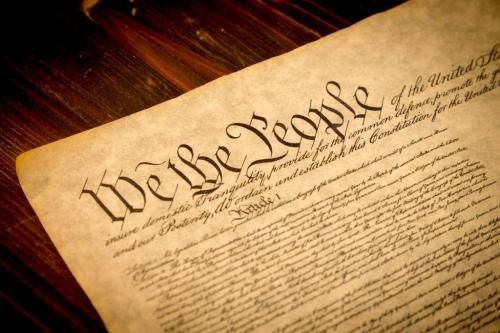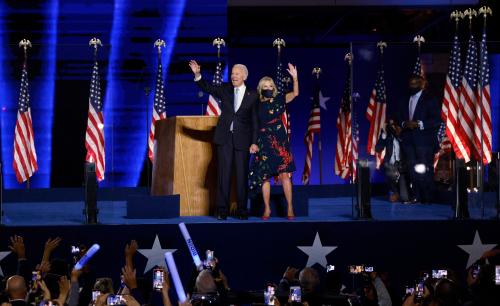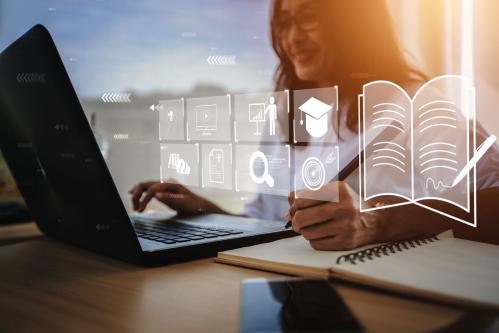Among the tall stack of executive orders on President Joe Biden’s desk on his first day in office was one that revoked an executive action from his predecessor that established the 1776 Commission. Donald Trump created the 1776 Commission to enhance “patriotic education” by suggesting changes to how students learn American history and civics. That commission issued a report in the waning days of the administration that sought to rewrite American history in right-wing rhetoric, with implications for U.S. schools.
Disbanding the 1776 Commission was, of course, the right move. It had all of the hallmarks of the Trump administration. Intentionally divisive and cruel, the commission’s name was a jab at The 1619 Project, and it timed the release of its report—which downplayed racism in American society—for Martin Luther King Jr. Day. The report itself is full of distortions, propaganda, and errors. It was produced by an unqualified group of partisans, overwhelmingly white and male, and has been roundly criticized by experts.
And yet, there’s something to the idea that we need to ask how American schools can help to build a more cohesive society and more resilient democracy. Americans’ lack of regard for their country—or, more accurately, the people with whom they share it—is a real problem with profoundly negative consequences. The Capitol insurrection offered a vivid illustration of that. And schools have an important role to play in addressing the problem.
A few months ago, I wrote an essay for Phi Delta Kappan in response to a question about how Americans define “good schools.” I argued that we’ve built an education system that treats the purpose of schooling almost exclusively as college and career preparation. Since at least the early 1980s, we’ve obsessed about the possibility, often overstated, that the economy is changing and U.S. schools are failing to keep up. Decades of education policy, practice, research, and rhetoric reinforce the idea that schools exist to prepare students academically for college and career.
But, as I argue in the piece, while we were preoccupied with preparing students for the 21st-century economy, we failed to prepare them for our 21st-century democracy. Our social and political terrain really did change on us. The emergence of social media, like talk radio and cable news before it, reshaped how we learn about the world and one another. We interact in ways we’ve never interacted before, often without face-to-face contact.
Navigating this new terrain requires a discrete set of skills and dispositions that don’t come naturally. How do we act with civility in a digital environment where we know people only by the antagonizing views they espouse? How, in a time of unvetted and manipulated information online, do we distinguish fact from fiction? We haven’t done these kinds of things well. Survey after survey shows that Americans struggle with disinformation, believe conspiracy theories at frighteningly high rates, and harbor wildly negative views of one another. For example, in a December 2020 NPR/Ipsos poll, only 47% of Americans called this ridiculous QAnon claim false: “A group of Satan-worshipping elites who run a child sex ring are trying to control our politics and media.”
These aren’t issues that will be resolved with yet more attention to math and English language arts. They reflect shortcomings that are different and deeper.
The ugliness of the last few years has rekindled interest in civics education on both the right and left. Many conservatives’ preferred approach is to instill patriotism through a renewed focus on teaching American history and ideals. Progressives worry that, if not done well, this will whitewash the past and distort students’ views of present-day America. Some prefer an action civics approach that engages students in the political process to address real-world problems. Conservatives call this educator activism masquerading as civics education.
Maybe these divergent views of civics education are more compatible than they seem. What is clear, though, is that navigating today’s landscape requires a set of skills and dispositions that are genuinely apolitical. They don’t reflect or promote any particular ideology. They’re tools that would help anyone to navigate a complex, changing world.
This list isn’t exhaustive, but would anyone disagree that we’d be better off if schools placed more emphasis on the following?
- Media literacy. Collectively, we haven’t been up to the task of discerning what’s credible from what’s not on the internet, and it’s negatively affected our politics and democracy. This will only get more difficult as deepfakes and other types of disinformation become more sophisticated. Some states have written media-literacy education into state law in recent years, but many others haven’t—or haven’t given it the attention it requires.
- Digital citizenship and empathy. Most of our social-emotional learning, at school and beyond, comes from face-to-face interactions with other people. We get cues to be kind and an impression that people have emotions and depth. But how does this work on Twitter, or for people we only see as caricatured political opponents? How can we develop empathy toward them, or at least not wish the worst for them? Many schools have introduced programs to combat cyberbullying in their own communities, which could be a start to thinking about digital citizenship more broadly.
- Intellectual humility. At a time when we find ourselves in echo chambers with people with whom we agree—and who quickly crush dissent—it’s easy to lose track of our fallibility and the value in seeking out conflicting perspectives. How do we instill intellectual humility in this context? How can we show how vulnerable we all are to being tricked and roused to anger (and, in fact, to radicalization—a topic that might soon enter education discussions).
These types of skills and dispositions don’t arise naturally. They need to be taught. And if schools—high schools, in particular—don’t teach them, who will?
Some states and districts have taken the lead on these issues in recent years, and hopefully more will follow. Organizations such as CIRCLE (on youth civic engagement), the Stanford History Education Group (on teaching digital literacy), and iCivics (with resources for teachers) are providing guidance and help. Groups such as We the Purple are building ideologically diverse coalitions with commitments and guidance to solidify our democratic norms.
School leaders have a lot on their plates right now, and they will for the foreseeable future. However, as we embark on a long effort to address pandemic-related learning loss, we need to remember that schools serve democratic purposes as well as economic purposes.






Commentary
We’ve built schools for a modern economy—but they overlook the challenges of our modern democracy
February 1, 2021